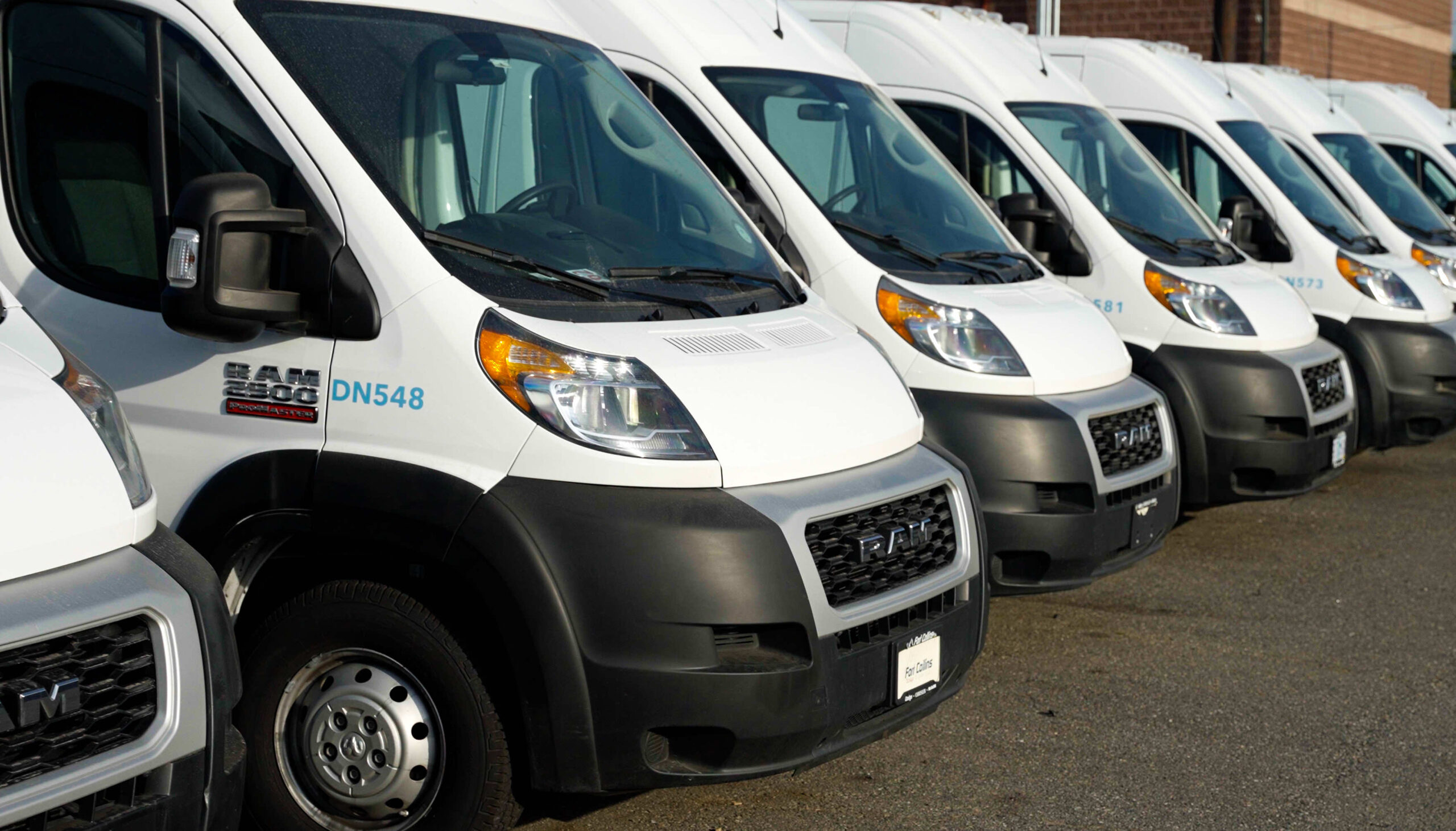
A line of Fluid Truck vans for rent. (Courtesy Fluid Truck)
Fluid Truck, the Denver startup that pairs renters with cargo vehicles, is bankrupt after two years of steep losses and a lawsuit accusing it of stealing $11 million from investors.
The company lost $18.7 million in fiscal year 2022 and $20.6 million in 2023, according to interim CEO Scott Avila. Then, $15 million in financing fell through this year.
“Faced with severely constrained liquidity, and after efforts to raise additional capital or debt financing failed, the debtors, in an exercise of their business judgment, made the difficult decision to commence these Chapter 11 cases,” Avila wrote in an affidavit Oct. 16.
Fluid, which is made up of two LLCs, hopes to sell to Kingbee Vans, a similar company in Utah. Kingbee is one of several firms loaning $7 million to Fluid to keep it afloat in the meantime.
“That is the only viable path available to maintain their business as a going concern,” Avila wrote of the sale last week, “and maximize value for their creditors and other stakeholders.”
The company acknowledges owing at least $50 million to more than 1,000 creditors, including $12 million to participants in its Fluid Vehicle Investor Platform. On Oct. 11, five days before it went bankrupt, an FVIP user sued Fluid for $11 million it allegedly stole from investors.
Fluid also owes $26 million to vendors, including $7.9 million to a Dodge dealership in Fort Collins.
The company was founded in Denver in 2016 as Fluid Market, an Uber-for-everything app that allowed users to rent a vast assortment of household items and vehicles. By 2018, it had become Fluid Truck and focused exclusively on vehicle rentals. It has since expanded to other major cities and partnered with Ikea.
Fluid Truck raised at least $80 million from investors. It announced a $63 million round in early 2021, and reported a nearly $18 million raise to the U.S. Securities and Exchange Commission in June 2023.

The former Clarion Inn hotel at 200 W. 48th Ave. in Globeville is seen from Fluid Truck’s headquarters at 400 W. 48th Ave. (BusinessDen file)
Fluid benefited from the pandemic, Avila explained, as home deliveries increased dramatically. Bolstered by its pandemic-era gains, Fluid then “commenced an aggressive growth plan in an effort to become the largest and premier provider in the truck-sharing space.” It expanded rapidly to other markets and drastically upped its vehicle count, its CEO said.
“The debtors’ ambitious growth strategy came with financial and operational complexities and risks that the debtors were unable to manage,” according to Avila’s affidavit.
Weaker-than-expected demand and “an inability to control expenses” harmed the company in the spring. Then, two national rental car companies realigned their fleets, putting thousands of used vehicles up for auction and decreasing demand for such vehicles.
“The market decline in vehicle values also was a factor in losing a $15 million financing commitment (Fluid) had obtained to help alleviate liquidity shortages,” Avila claims.
By the summer, Avila says, “it became clear” that Fluid’s “aggressive growth had outpaced its internal systems, procedures and controls. When coupled with inadequate attention to the underlying financial performance of the business,” it was “in a severe liquidity situation.”
In mid-August, Avila told Fluid’s board that a Chapter 7 bankruptcy — a closure of the business — would likely be necessary. But one week later, Kingbee was identified as a possible buyer and a lender. Avila now expects Fluid’s sale to occur “in the very near term.”
Last week’s affidavit suggests Fluid’s board was in flux for much of this summer. In July, it voted to fire founders James Eberhard and Jenifer Snyder, a brother-and-sister duo who were its CEO and lawyer, respectively. But then, two weeks later, Eberhard and Snyder had two board members removed and installed others in their place. This new board then undid the earlier board’s decision and put Eberhard in charge of finding capital for Fluid.
Finally, in August, the two board members who Eberhard and Snyder appointed resigned and this third board took away the founders’ access to Fluid’s bank accounts, Avila said.
Fluid has 127 full-time employees and 88 contractors, according to its bankruptcy paperwork. The company’s fleet numbers 5,500 vans and trucks, 3,500 of which are FVIP-owned.
Its lawyers are Laura Jones and Maxim Litvak at Pachulski Stang Ziehl & Jones in Delaware.

A line of Fluid Truck vans for rent. (Courtesy Fluid Truck)
Fluid Truck, the Denver startup that pairs renters with cargo vehicles, is bankrupt after two years of steep losses and a lawsuit accusing it of stealing $11 million from investors.
The company lost $18.7 million in fiscal year 2022 and $20.6 million in 2023, according to interim CEO Scott Avila. Then, $15 million in financing fell through this year.
“Faced with severely constrained liquidity, and after efforts to raise additional capital or debt financing failed, the debtors, in an exercise of their business judgment, made the difficult decision to commence these Chapter 11 cases,” Avila wrote in an affidavit Oct. 16.
Fluid, which is made up of two LLCs, hopes to sell to Kingbee Vans, a similar company in Utah. Kingbee is one of several firms loaning $7 million to Fluid to keep it afloat in the meantime.
“That is the only viable path available to maintain their business as a going concern,” Avila wrote of the sale last week, “and maximize value for their creditors and other stakeholders.”
The company acknowledges owing at least $50 million to more than 1,000 creditors, including $12 million to participants in its Fluid Vehicle Investor Platform. On Oct. 11, five days before it went bankrupt, an FVIP user sued Fluid for $11 million it allegedly stole from investors.
Fluid also owes $26 million to vendors, including $7.9 million to a Dodge dealership in Fort Collins.
The company was founded in Denver in 2016 as Fluid Market, an Uber-for-everything app that allowed users to rent a vast assortment of household items and vehicles. By 2018, it had become Fluid Truck and focused exclusively on vehicle rentals. It has since expanded to other major cities and partnered with Ikea.
Fluid Truck raised at least $80 million from investors. It announced a $63 million round in early 2021, and reported a nearly $18 million raise to the U.S. Securities and Exchange Commission in June 2023.

The former Clarion Inn hotel at 200 W. 48th Ave. in Globeville is seen from Fluid Truck’s headquarters at 400 W. 48th Ave. (BusinessDen file)
Fluid benefited from the pandemic, Avila explained, as home deliveries increased dramatically. Bolstered by its pandemic-era gains, Fluid then “commenced an aggressive growth plan in an effort to become the largest and premier provider in the truck-sharing space.” It expanded rapidly to other markets and drastically upped its vehicle count, its CEO said.
“The debtors’ ambitious growth strategy came with financial and operational complexities and risks that the debtors were unable to manage,” according to Avila’s affidavit.
Weaker-than-expected demand and “an inability to control expenses” harmed the company in the spring. Then, two national rental car companies realigned their fleets, putting thousands of used vehicles up for auction and decreasing demand for such vehicles.
“The market decline in vehicle values also was a factor in losing a $15 million financing commitment (Fluid) had obtained to help alleviate liquidity shortages,” Avila claims.
By the summer, Avila says, “it became clear” that Fluid’s “aggressive growth had outpaced its internal systems, procedures and controls. When coupled with inadequate attention to the underlying financial performance of the business,” it was “in a severe liquidity situation.”
In mid-August, Avila told Fluid’s board that a Chapter 7 bankruptcy — a closure of the business — would likely be necessary. But one week later, Kingbee was identified as a possible buyer and a lender. Avila now expects Fluid’s sale to occur “in the very near term.”
Last week’s affidavit suggests Fluid’s board was in flux for much of this summer. In July, it voted to fire founders James Eberhard and Jenifer Snyder, a brother-and-sister duo who were its CEO and lawyer, respectively. But then, two weeks later, Eberhard and Snyder had two board members removed and installed others in their place. This new board then undid the earlier board’s decision and put Eberhard in charge of finding capital for Fluid.
Finally, in August, the two board members who Eberhard and Snyder appointed resigned and this third board took away the founders’ access to Fluid’s bank accounts, Avila said.
Fluid has 127 full-time employees and 88 contractors, according to its bankruptcy paperwork. The company’s fleet numbers 5,500 vans and trucks, 3,500 of which are FVIP-owned.
Its lawyers are Laura Jones and Maxim Litvak at Pachulski Stang Ziehl & Jones in Delaware.



